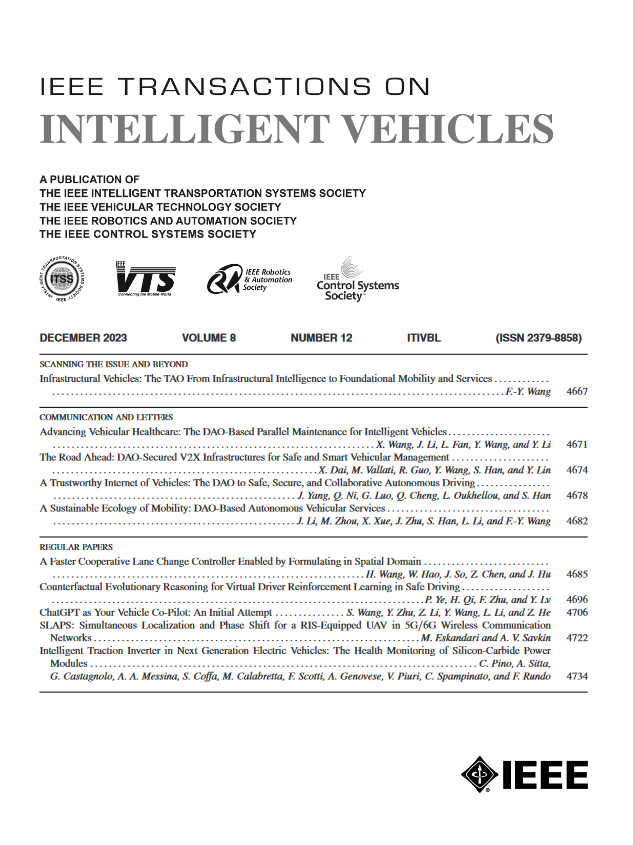基于异构图深度强化学习的自动公交信号优先策略
IF 14.3
1区 工程技术
Q1 COMPUTER SCIENCE, ARTIFICIAL INTELLIGENCE
引用次数: 0
摘要
车辆通信和自动驾驶技术的快速发展导致自动公共交通车辆(aptv)的出现,在提高按需灵活路线交通服务的效率方面发挥着关键作用。进一步优化这些服务和缓解城市交通拥堵的一个有希望的方法是开发更智能的交通信号优先(TSP)策略。针对支持灵活路线交通服务的TSP策略,提出了一种基于深度强化学习(DRL)的分散智能交通信号控制算法。该算法可以适应不同的路网结构和APTV普及率,具有广泛的适用性。具体来说,它采用了异构图模型来捕获各种信息,包括网络拓扑结构和aptv的动态特征。通过在不同道路网络和交通状况的多种场景下的广泛测试,我们的算法始终优于传统的交通控制方法和最先进的基于drl的方法。此外,它还展示了有效的零射击可转移性,无需额外训练即可适应现实世界的场景。本文章由计算机程序翻译,如有差异,请以英文原文为准。
Transit Signal Priority Strategy With Heterogeneous Graph-Based Deep Reinforcement Learning for Autonomous Public Transit Vehicles
Rapid advancements in vehicle communication and autonomous driving technologies have led to the emergence of Autonomous Public Transit Vehicles (APTVs), playing a pivotal role in enhancing the efficiency of on-demand flexible-route transit services. One promising approach to further optimize these services and alleviate urban traffic congestion is the development of smarter Transit Signal Priority (TSP) strategies. This paper proposes a decentralized intelligent traffic signal control algorithm based on Deep Reinforcement Learning (DRL), tailored for the TSP strategy supporting flexible-route transit services. Our algorithm can accommodate various road network structures and APTV penetration rates, ensuring extensive applicability. Specifically, it employs a heterogeneous graph model to capture diverse information, including network topologies and dynamic characteristics of APTVs. Through extensive testing in multiple scenarios across varied road networks and traffic conditions, our algorithm has consistently outperformed both traditional traffic control methods and state-of-the-art DRL-based methods. Furthermore, it demonstrates effective zero-shot transferability, adapting to real-world scenarios without additional training.
求助全文
通过发布文献求助,成功后即可免费获取论文全文。
去求助
来源期刊

IEEE Transactions on Intelligent Vehicles
Mathematics-Control and Optimization
CiteScore
12.10
自引率
13.40%
发文量
177
期刊介绍:
The IEEE Transactions on Intelligent Vehicles (T-IV) is a premier platform for publishing peer-reviewed articles that present innovative research concepts, application results, significant theoretical findings, and application case studies in the field of intelligent vehicles. With a particular emphasis on automated vehicles within roadway environments, T-IV aims to raise awareness of pressing research and application challenges.
Our focus is on providing critical information to the intelligent vehicle community, serving as a dissemination vehicle for IEEE ITS Society members and others interested in learning about the state-of-the-art developments and progress in research and applications related to intelligent vehicles. Join us in advancing knowledge and innovation in this dynamic field.
 求助内容:
求助内容: 应助结果提醒方式:
应助结果提醒方式:


